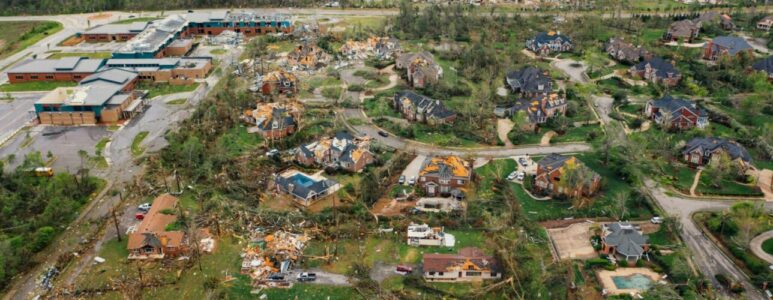
Hurricane season can bring not only powerful winds and heavy rains, but also the risk of tornadoes and waterspouts. Spawned by hurricanes, both tornadoes and waterspouts can develop rapidly and cause severe damage. It’s crucial to be prepared. At Heritage Insurance, we understand the importance of safeguarding your home and loved ones. Here are some essential tips to help you stay safe from tornadoes and waterspouts during hurricane season.
To better understand the risks of tornadoes and waterspouts, it’s important to know that both are developed in the outer bands of the storm. These can form rapidly, often with little to no warning, and can be obscured by rain or darkness. Understanding these facts is the first step in being prepared.
There are four important steps in preparing for tornadoes and waterspouts that are spawned from hurricanes.
First, you should prepare your emergency kit. This emergency kit can be the same one that you prepare for hurricane season, or a secondary kit that you keep in a different part of your home as a backup. This kit should include food, water, medications, flashlights, batteries, important documents, and communication tools such as a radio or walkie-talkies.
Next, you should designate a safe room inside your home. This should be a small, windowless room on the lowest level of your home, such as a basement, storm cellar, interior bathroom or closet. If possible, reinforce this area with additional protection such as storm shutters or plywood to shield against debris. Equip your safe room with your emergency kit, blankets, and a whistle to signal for help in the event that you are trapped.
Then, plan and practice getting to your safe room with your family. This can save you and your family valuable time if a tornado or waterspout is heading towards your home. Ensure everyone knows where to go and how to get there quickly. You should practice tornado drills with your family regularly to prevent panic when the risk is imminent. Include your pets in your emergency plan and practices to ensure that they also have the supplies necessary for shelter in your safe room.
Finally, stay informed about all weather updates. It is wise to get a hand-crank or battery-powered radio to tune into your local weather station when the power is out. Sign up for local weather alerts on your phone and monitor NOAA Weather Radio for the latest updates. You should also familiarize yourself with common weather terms such as storm surge, tropical storm warning, tropical storm watch, etc., which can be found in our company’s comprehensive hurricane guide. Staying informed is crucial during hurricane season, especially with the rapid development of tornadoes and waterspouts during a hurricane.

Another way to stay ahead of possible catastrophic weather is to familiarize yourself with the signs of approaching tornadoes and waterspouts. Some common signs of an approaching tornado are a dark, greenish sky, large hail, a loud roar similar to that of a freight train, and visible funnel clouds. Common signs of an approaching waterspout are rapid winds, high seas, large hail, and dangerous lightning.
When a tornado warning is issued, act immediately by seeking shelter, protecting yourself, and staying put. Immediately locate your safe room and barricade yourself inside. If you are not at home, find the nearest sturdy building and take shelter in an interior room on the lowest floor. Protect yourself with heavy blankets, sleeping bags, or a mattress to guard your body from flying debris. Remain in your shelter or safe room until the tornado warning has been lifted and you have confirmation that it is safe to emerge.
Once a tornado has passed, you should continue to remain cautious. Assess yourself and your family members for injuries and provide first aid if necessary. Be aware of hazards such as broken glass, downed powerline, structural damage, and other sharp debris that may have been displaced during the storm. Contact the authorities if any injuries or significant damage has occurred. Follow their instructions for safety and recovery and remember to be patient as there may be others who are facing more immediate danger. Document any damage that has occurred by taking photos and contacting your insurance company as soon as possible to report a claim.
Understanding your homeowner’s insurance policy is crucial during hurricane season. Your policy may cover damage from tornadoes and waterspouts, including structural damage to your home and personal belongings. You should review your coverages and speak with your agent before hurricane season to ensure you are adequately protected.
At Heritage Insurance, we are dedicated to helping you prepare for and recover from natural disasters. By taking these steps to ensure tornado and waterspout safety, you can protect your home and loved ones from the unexpected.
Stay safe this hurricane season; remember, preparation is key to mitigating the risks of hurricanes, tornadoes, and waterspouts.






